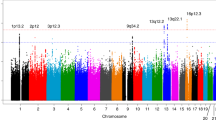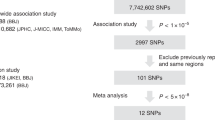Abstract
Gastric cancer is classified into intestinal and diffuse types, the latter including a highly malignant form, linitis plastica. A two-stage genome-wide association study (stage 1: 85,576 SNPs on 188 cases and 752 references; stage 2: 2,753 SNPs on 749 cases and 750 controls) in Japan identified a significant association between an intronic SNP (rs2976392) in PSCA (prostate stem cell antigen) and diffuse-type gastric cancer (allele-specific odds ratio (OR) = 1.62, 95% CI = 1.38–1.89, P = 1.11 × 10−9). The association was far less significant in intestinal-type gastric cancer. We found that PSCA is expressed in differentiating gastric epithelial cells, has a cell-proliferation inhibition activity in vitro and is frequently silenced in gastric cancer. Substitution of the C allele with the risk allele T at a SNP in the first exon (rs2294008, which has r2 = 0.995, D′ = 0.999 with rs2976392) reduces transcriptional activity of an upstream fragment of the gene. The same risk allele was also significantly associated with diffuse-type gastric cancer in 457 cases and 390 controls in Korea (allele-specific OR = 1.90, 95% CI = 1.56–2.33, P = 8.01 × 10−11). The polymorphism of the PSCA gene, which is possibly involved in regulating gastric epithelial-cell proliferation, influences susceptibility to diffuse-type gastric cancer.
This is a preview of subscription content, access via your institution
Access options
Subscribe to this journal
Receive 12 print issues and online access
$209.00 per year
only $17.42 per issue
Buy this article
- Purchase on Springer Link
- Instant access to full article PDF
Prices may be subject to local taxes which are calculated during checkout



Similar content being viewed by others
References
Crew, K.D. & Neugut, A.I. Epidemiology of gastric cancer. World J. Gastroenterol. 12, 354–362 (2006).
Ushijima, T. & Sasako, M. Focus on gastric cancer. Cancer Cell 5, 121–125 (2004).
Lauren, P. The two histological main types of gastric carcinoma: diffuse and so-called intestinal-type carcinoma. An attempt at a histo-clinical classification. Acta Pathol. Microbiol. Scand. 64, 31–49 (1965).
Hohenberger, P. & Gretschel, S. Gastric cancer. Lancet 362, 305–315 (2003).
Saito, A., Shimoda, T., Nakanishi, Y., Ochiai, A. & Toda, G. Histologic heterogeneity and mucin phenotypic expression in early gastric cancer. Pathol. Int. 51, 165–171 (2001).
Machado, J.C. et al. E-cadherin gene mutations provide a genetic basis for the phenotypic divergence of mixed gastric carcinomas. Lab. Invest. 79, 459–465 (1999).
Schier, S. & Wright, N.A. Stem cell relationships and the origin of gastrointestinal cancer. Oncology 69 (Suppl. 1), 9–13 (2005).
Rosai, J. in Rosai and Ackerman's Surgical Pathology, Ch. 11, Gastrointestinal tract—stomach 648–711 (Mosby, Edinburgh, 2004).
Japanese Gastric Cancer Association Registration Committee. Gastric cancer treated in 1991 in Japan: data analysis of nationwide registry. Gastric Cancer 9, 51–66 (2006).
Yokota, T. et al. Borrmann's type IV gastric cancer: clinicopathologic analysis. Can. J. Surg. 42, 371–376 (1999).
Henson, D.E., Dittus, C., Younes, M., Nguyen, H. & Albores-Saavedra, J. Differential trend in the intestinal and diffuse types of gastric carcinoma in United States, 1973–2000 – increase in the signet ring cell type. Arch. Pathol. Lab. Med. 128, 765–770 (2004).
Shinmura, K. et al. Familial gastric cancer: clinicopathological characteristics, RER phenotype and germline p53 and E-cadherin mutations. Carcinogenesis 20, 1127–1131 (1999).
Lichtenstein, P. et al. Environmental and heritable factors in the causation of cancer: analyses of cohorts of twins from Sweden, Denmark, and Finland. N. Engl. J. Med. 343, 78–85 (2000).
Correa, P. & Shiao, Y.-H. Phenotypic and genotypic events in gastric carcinogenesis. Cancer Res. 54 (7 Suppl.), 1941s–1943s (1994).
González, C.A., Sala, N. & Capellá, G. Genetic susceptibility and gastric cancer risk. Int. J. Cancer 100, 249–260 (2002).
Hirakawa, M. et al. JSNP: a database of common gene variations in the Japanese population. Nucleic Acids Res. 30, 158–162 (2002).
Haga, H., Yamada, R., Nakamura, Y. & Tanaka, T. Gene-based SNP discovery as part of the Japanese Millennium Genome Project: identification of 190,562 genetic variations in the human genome. J. Hum. Genet. 47, 605–610 (2002).
Yoshida, T. & Yoshimura, K. Outline of disease gene hunting approaches in the Millennium Genome Project of Japan. Proc. Jpn. Acad. 79, 34–50 (2003).
Kato, N. et al. High-density association study and nomination of susceptibility genes for hypertension in the Japanese National Project. Hum. Mol. Genet. 17, 617–627 (2008).
Reiter, R.E. et al. Prostate stem cell antigen: a cell surface marker overexpressed in prostate cancer. Proc. Natl. Acad. Sci. USA 95, 1735–1740 (1998).
Gu, Z. et al. Prostate stem cell antigen (PSCA) expression increases with high gleason score, advanced stage and bone metastasis in prostate cancer. Oncogene 19, 1288–1296 (2000).
Bahrenberg, G., Brauers, A., Joost, H.-G. & Jakse, G. Reduced expression of PSCA, a member of the LY-6 family of cell surface antigen, in bladder, esophagus, and stomach tumors. Biochem. Biophys. Res. Commun. 275, 783–788 (2000).
Sato, Y. et al. Designing a multistage, SNP-based, genome screen for common diseases. J. Hum. Genet. 49, 669–676 (2004).
Karam, S. & Leblond, C.P. Origin and migratory pathways of the eleven epithelial cell types present in the body of the mouse stomach. Microsc. Res. Tech. 31, 193–214 (1995).
Karam, S.M., Straiton, T., Hassen, W.M. & Leblond, C.P. Defining epithelial cell progenitors in the human oxyntic mucosa. Stem Cells 21, 322–336 (2003).
Fukaya, M. et al. Hedgehog signal activation in gastric pit cell and in diffuse-type gastric cancer. Gastroenterology 131, 14–29 (2006).
Saffran, D.C. et al. Anti-PSCA mAbs inhibit tumor growth and metastasis formation and prolong the survival of mice bearing human prostate cancer xenografts. Proc. Natl. Acad. Sci. USA 98, 2658–2663 (2001).
Gu, Z., Yamashiro, J., Kono, E. & Reiter, R.E. Anti-prostate stem cell antigen monoclonal antibody 1G8 induces cell death in vitro and inhibits tumor growth in vivo via a Fc-independent mechanism. Cancer Res. 65, 9495–9500 (2005).
Wang, G.-Y., Lu, C.-Q., Zhang, R.-M., Hu, X.-H. & Luo, Z.W. The E-cadherin gene polymorphism -160C/A and cancer risk: A HuGE review and meta-analysis of 26 case-control studies. Am. J. Epidemiol. 167, 7–14 (2008).
Humar, B. et al. Association of CDH1 haplotypes with susceptibility to sporadic diffuse gastric cancer. Oncogene 21, 8192–8195 (2002).
Pharoah, P.D. et al. CDH1 c-160a promotor polymorphism is not associated with risk of stomach cancer. Int. J. Cancer 101, 196–197 (2002).
Smith, M.G., Hold, G.L., Tahara, E. & El-Omar, E.M. Cellular and molecular aspects of gastric cancer. World J. Gastroenterol. 12, 2979–2990 (2006).
Sasazuki, S. et al. Effect of Helicobacter pylori infection combined with CagA and pepsinogen status on gastric cancer development among Japanese men and women: a nested case-control study. Cancer Epidemiol. Biomarkers Prev. 15, 1341–1347 (2006).
Kamangar, F., Cheng, C., Abnet, C.C. & Rabkin, C.S. Interleukin-1B polymorphisms and gastric cancer risk-a meta-analysis. Cancer Epidemiol. Biomarkers Prev. 15, 1920–1928 (2006).
Tran, C.P., Lin, C., Yamashiro, J. & Reiter, R.E. Prostate stem cell antigen is a marker of late intermediate prostate epithelial cells. Mol. Cancer Res. 1, 113–121 (2002).
Sharom, F.J. & Radeva, G. GPI-anchored cleavage in the regulation of transmembrane signals. in Subcellular Biochemistry, Volume 37: Membrane Dynamics and Domains (ed. Quinn, P.J.) 285–315 (Kluwer Academic/Plenum Publishers, New York, 2004).
De Nooij-van Dalen, A.G. et al. Characterization of the human LY-6 antigens, the newly annotated member LY-6K included, as molecular markers for head-and-neck squamous cell carcinoma. Int. J. Cancer 103, 768–774 (2003).
Pharoah, P.D. et al. Polygenic susceptibility to breast cancer and implications for prevention. Nat. Genet. 31, 33–36 (2002).
Japanese Gastric Cancer Association. Japanese classification of gastric carcinoma. - 2nd English edition Gastric Cancer 1, 10–24 (1998).
Fenoglio-Preiser, C. et al. Gastric carcinoma. in WHO Classification of Tumours: Tumours of the Digestive System (eds. Hamilton, S.R. & Aaltonen, L.A.) 39–52 (IARC Press, Lyon, 2000).
Noguchi, M., Furuya, S., Takeuchi, T. & Hirohashi, S. Modified formalin and methanol fixation methods for molecular biological and morphological analyses. Pathol. Int. 47, 685–691 (1997).
Ohnishi, Y. et al. A high-throughput SNP typing system for genome-wide association studies. J. Hum. Genet. 46, 471–477 (2001).
Hirschhorn, J.N. & Daly, M.J. Genome-wide association studies for common diseases and complex traits. Nat. Rev. Genet. 6, 95–108 (2005).
Epstein, M.P. & Satten, G.A. Inference on haplotype effects in case-control studies using unphased genotype data. Am. J. Hum. Genet. 73, 1316–1329 (2003).
Falush, D., Stephens, M. & Pritchard, J.K. Inference of population structure using multilocus genotype data: linked loci and correlated allele frequencies. Genetics 164, 1567–1587 (2003).
Bacanu, S.-A., Devlin, B. & Roeder, K. The power of genomic control. Am. J. Hum. Genet. 66, 1933–1944 (2000).
Zhu, X., Zhang, S., Zhao, H. & Cooper, R.S. Association mapping, using a mixture model for complex traits. Genet. Epidemiol. 23, 181–196 (2002).
Nei, M. Molecular Evolutionary Genetics (Columbia University Press, New York, 1987).
Saeki, N. et al. GASDERMIN, suppressed frequently in gastric cancer, is a target of LMO1 in TGF-beta-dependent apoptotic signalling. Oncogene 26, 6488–6498 (2007).
Acknowledgements
This work was supported in Japan by the program for promotion of Fundamental Studies in Health Sciences of the National Institute of Biomedical Innovation (NiBio) and by Health and Labour Sciences Research Grants by Ministry of Health, Labour and Welfare. The Korean part of the study was supported by grant 0710340 from the National Cancer Center, Korea.
We thank the following people (listed in alphabetical order) for discussion and technical and statistical assistance: M. Asako, T. Chujo, C. Hamada, T. Hayashida, C. Hirama, F. Igarashi, T. Imai, E. Inoue, S. Kamakami, A. Katoh, O. Kawaguchi, C. Kina, N. Kurata, Y. Liu, G. Maeno, S. Mimaki, N. Mitsuhashi, N. Miyahara, A. Miyaoka, R. Nakajima, J. Nakata, Y. Odaka, T. Ogiwara, N. Ohsawa, E. Ohshima, M. Okada, M. Okuyama, Y. Sakashita, M. Sato, M. Seishi, T. Sobue, H. Suganami, E. Takemoto, T. Taniguchi, S. Uchida, T. Urushidate, M. Ushiama, S. Yabe, N. Yamaguchi, S. Yamamoto and I. Yoshimura.
Author information
Authors and Affiliations
Consortia
Contributions
Principal investigators: H. Sakamoto, K. Yoshimura and N.S. Gastric cancer project planning and design: H. Sakamoto, K. Yoshimura, T.Y., H.K. and T.S. Ascertainment of subjects for genetic analyses: H.K., T.S., Y.M., D.S., H. Sugimura, F.T., S.K., N. Matsukura, N. Matsuda, T. Nakamura, I. Hyodo, T. Nishina, W.Y., H.H., M.H., E.T. and S.H. Genetic analyses: H. Sakamoto, Sumiko Ohnami, A.S. and Y.N. Statistical analyses and database: K. Yoshimura, Y.S., H.T., M.A., R.T., Y.T., M.O., K. Aoki, I. Honmyo and S.C. Functional analyses: N.S., K. Aoyagi, H. Sasaki, Sumiko Ohnami, Shunpei Ohnami, K. Yanagihara and H. Sakamoto. National Cancer Center, Korea: K.-A.Y., M.-C.K., Y.-S.L., S.R.P., C.G.K. and I.J.C. Millennium Genome Project Cancer Subteam Leader: T.Y. Millennium Genome Project Human Genome Variation Team Leader: Y.N. Millennium Genome Project Disease Gene Team Leader: S.H.
Corresponding author
Supplementary information
Supplementary Text and Figures
Supplementary Figures 1–12, Supplementary Tables 1–3, Supplementary Methods and Supplementary Note (PDF 1859 kb)
Rights and permissions
About this article
Cite this article
The Study Group of Millennium Genome Project for Cancer. Genetic variation in PSCA is associated with susceptibility to diffuse-type gastric cancer. Nat Genet 40, 730–740 (2008). https://doi.org/10.1038/ng.152
Received:
Accepted:
Published:
Issue Date:
DOI: https://doi.org/10.1038/ng.152
This article is cited by
-
LINC00240 in the 6p22.1 risk locus promotes gastric cancer progression through USP10-mediated DDX21 stabilization
Journal of Experimental & Clinical Cancer Research (2023)
-
Polymorphism in autophagy-related genes LRP1 and CAPZA1 may promote gastric mucosal atrophy
Genes and Environment (2023)
-
Spatial and temporal diversity of positive selection on shared haplotypes at the PSCA locus among worldwide human populations
Heredity (2023)
-
Association of single nucleotide polymorphisms (SNPs) with gastric cancer susceptibility and prognosis in population in Wuwei, Gansu, China
World Journal of Surgical Oncology (2022)
-
Helicobacter pylori shows tropism to gastric differentiated pit cells dependent on urea chemotaxis
Nature Communications (2022)



